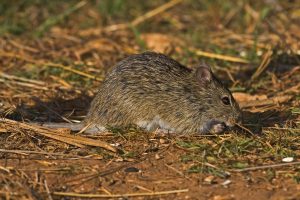Rodents and Hantavirus Pulmonary Syndrome
Rodents and Hantavirus Pulmonary Syndrome are a duo that no one should ever encounter. According to Human Diseases and Conditions, the Hantavirus Pulmonary Syndrome is defined as a lung disease that causes respiratory distress and, in some cases, death. Hantavirus, the virus that causes the disease, is carried by rodents. 
While the disease is carried by rodents, it does not make them sick. They shed the hantavirus through their saliva, urine and droppings. Humans come in contact with the disease when they disturb the dried droppings (ex. by sweeping) and inhale the particles that are sent into the air. People can also contract the disease by touching an infected animal or dried droppings and then touching their nose or mouth.
The most common carriers of HPS are the deer mouse, cotton rats, rice rats and white footed mice. People of every age, sex and race can contract HPS but it is not contagious and cannot be spread to other humans.
Symptoms
Symptoms of HPS usually appear 1-5 weeks after a person has been exposed to the virus. It can be difficult to diagnose at first because many of the symptoms are similar to the flu (fever, tiredness and body aches). From 2-5 days after the first symptoms, a person infected starts coughing and experiences shortness of breath. The disease quickly becomes more severe, and people who do not receive immediate treatment may become extremely ill and go into shock, requiring intensive care in a hospital.
How Can You Protect Yourself Against Rodents and Hantavirus Pulmonary Syndrome?
The best way of avoiding contracting this disease is to eliminate sources of possible infection, which means avoiding woodpiles and other places where rodents live outdoors and keeping homes and workplaces free of mice and rats. Experts also recommend sealing off holes where rodents can enter and wearing a mask and gloves when cleaning areas with rodent droppings.
CLICK HERE to contact us today to schedule a free, no obligation pest inspection. We can help you get rid of a current rodent problem AND prevent them in the future.
